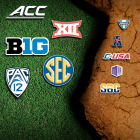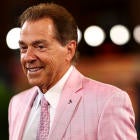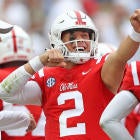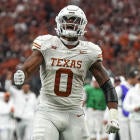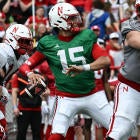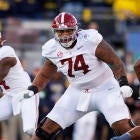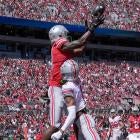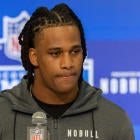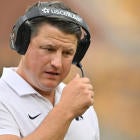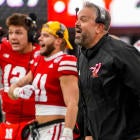University of Utah economist Ted Tatos was asked to consider whether the coronavirus could impact a second consecutive NCAA Tournament. While schools are eagerly anticipating a return of college football, let's not forget how this historic moment in time began in the college sports world.
Despite the pandemic, the NCAA's foundation has already been in question. But during these uncertain times, the association may be one more calamitous event away from slipping off a cliff of relevancy.
"If there's no NCAA Tournament next year," Tatos said. "… I think then there has to be a breakaway from this model."
To put it more plainly, a separation of the Power Five conferences from the NCAA has long been possible. Those 65 schools, including independent Notre Dame, already exist as separate entities -- financially, competitively and even corporately. But with the coronavirus ratcheting up the stakes, a tipping point may be at hand.
"I'm telling you, if you or I were going to place a bet on a stock … you could double down on the Power Five being a separate entity now within two years," said Vince Thompson, founder and CEO of MELT, an Atlanta-based sports and entertainment marketing firm.
Basketball would be the tipping point here because it is the financial backbone of the NCAA. College athletics is experiencing what it's like to be without March Madness for one year.
For now, Thompson -- an Auburn graduate who has been a part of 16 Final Fours -- is already forecasting an accelerated timeline for massive changes in college athletics due to the coronavirus.
"With or without a cure, you're looking at forced modernization of the NCAA. It is going to be an accelerated seismic shift in college athletics," he said. "The good Lord has a wicked sense of humor. It is forcing a lot of hands that even three months ago, [if] you and I would have had this conversation, we'd be laughing about it."
The economy has opened the door
No one is laughing these days. The economy is tanking, dragging college athletics down with it. The NCAA's relevancy and might have never been more in question. It is losing in court. It is losing its mission. It long ago lost in the court public opinion. There are few brands with a lower Q rating.
These last months have laid bare how even large athletic departments live paycheck to paycheck. Until two months ago, we would have never considered March Madness being canceled.
The economic impact has caused such upheaval in college sports that schools began trimming budgets, personnel and sports. Some coaches took temporary pay cuts.
A fissure in the college athletic power structure has widened. The NCAA is the middle juggling a pandemic, its finances and an increasingly skeptical membership.
Iowa State athletic director Jamie Pollard warned of an "ice age" if the 2020 college football season isn't played. As bad as March Madness' cancellation was for schools, the shortfall was only a fraction of what football delivers: typically 80% of athletic budgets in a $6.5 billion industry.
A Washington University study commissioned by ESPN stated, if the football season were canceled, the Power Five could lose $4 billion.
"The next year will be a critical year for the NCAA," Tatos said. "It will be a critical year for college athletics as a whole. But I think we are starting to see how professional this enterprise is, how divorced it is from any type of education. Schools are starting to make decisions on financial points, [saying], 'This is amateur sports? This whole charade is coming to an end.'"
If the financial reckoning becomes severe enough, entire athletic departments could go away. Already, the Mid-American Conference is slashing budgets and sports. Never mind athletics, Akron cut six of its 11 departments within the university.
"We're going to lose institutions," Notre Dame AD Jack Swarbrick predicted. "We're going to have a number of member institutions who won't be involved in college education in 3-4 years."
The dividing line between the haves and have nots is simple sports Darwinism. Large public state universities with massive followings can be athletically self-sufficient. Below that line, the more state subsidies schools use in the form of student fees, the more vulnerable they are.
That's why the likes of the MAC have shuddered financially. More schools will follow if for no other reason than this: If sports aren't being played and enrollment doesn't go up, those fees will dry up.
The NCAA's relevancy is fading
If the underpinnings of the current structure are further weakened, the Power Five would be able to survive athletically, competitively and corporately. Their brand, influence and economics are better than that of their membership organization.
In other words, they -- not the NCAA -- are the game.
"The NCAA is becoming less and less relevant," said one Power Five president who did not wish to be identified. "I could see the Power Five conferences creating their own version of the NCAA."
Thompson calls it a "grand reckoning" between the NCAA's amateur ideal (the so-called "collegiate model") and athletic departments' for-profit business model.
"That is the greatest inherent friction of all time," Thompson said. "Those two [things] can't serve the same master mutually."
That forced modernization of college athletics may force the NCAA to either remake itself or be left behind.
It already seems to be ceding it power asking for help from Congress to fully implement name, image and likeness legislation.
Even a year ago, the NCAA was loathe to allow the federal government into its affairs. Now, the association and Power Five are spending hundreds of thousands on Washington, D.C. lobbyists to make it gets an antitrust exemption from Congress. That after moving the amateur goalposts once again. For decades, the NCAA was willing to die on a hill screaming "not a penny more" for athletes beyond room, board, books, tuition and fees.
If the NCAA gets its wish for an antitrust exemption from Congress, it will not only lose a large part of that argument, it will lose part of its identity and power. In some way, the feds will be calling the shots with that much invested in the system.
The setting will not be unlike a pitch on "Shark Tank" where budding companies sell part of their equity to the highest bidder.
Think about it: The same association that defines itself as the benevolent overseer of athletics as a recreational complement to education will soon, grudgingly, watch athletes earn six figures based on their athletic fame. Those players would be "professionalized," which is essentially everything the NCAA is against.
"How they can maintain a position that is simply not justifiable?" said Ellen Staurowsky, professor of Sport Management at Drexel University. "If you look at the roots of amateurism, which has now been incorporated into court rulings, this whole idea of the revered tradition of amateurism [is false]."
More friction: The NCAA has done itself no favors with recent enforcement dealings.
Criticism continues to roil throughout college athletics over the North Carolina case that concluded 2 ½ years ago. The school avoided any major penalties despite what some saw as an 18-year pattern of continued academic fraud.
The NCAA also took no action after the Rice Commission -- assembled to clean up college basketball -- specifically asked for a clearer definition of academic conduct.
Further consternation was caused by the NCAA Board of Directors. It deemed there would be no appeal to rulings made in the new Independent Accountability Resolution Process. Memphis, NC State and Kansas basketball all recently entered that process. The NCAA has drawn strong criticism from NC State and Kansas as their cases continue.
The Washington Post recently called NCAA credibility into question again: Why wasn't it better prepared for the cancellation of the basketball tournament? The NCAA on Tuesday released a detailed accounting of their insurance coverage and how they arrived at the payout post-tournament cancellation. The NCAA Tournament is covered for 2021.
"You saw a dilution or dismantling of the NCAA prior to that," Thompson said. "But they don't have anybody to blame but themselves. The ultimate institutional arrogance lies in Indianapolis."
As a membership organization in charge of the safety and welfare of athletes returning amid a pandemic, the NCAA simply cannot allow anything to go wrong. Unlike professionals, college athletes can't dictate working conditions. They don't have a union. They are at the mercy of adults who can't screw it up.
Former NCAA executive director Walter Byers railed against the organization he used to run with an iron fist in his 1995 book, "Unsportsmanlike Conduct, Exploiting College Athletes." Byers said: "Collegiate amateurism is not a moral issue. It is economic camouflage for monopoly practice."
Fast forward to 2014. In defending accusations of monopolistic practices, an NCAA lawyer said: "It is a cartel that does good things, as opposed to a cartel that goes bad things."
Huh?
"The NCAA, the model of 'amateurism' is evolving," Penn State coach James Franklin said. "It's going to be a transition. It's going to be tricky."
What would a Power Five breakaway look like?
It is becoming clear it will be the Power Five that will lead college athletics out of the pandemic. For better or worse, the ACC, Big Ten, Big 12, Pac-12 and SEC control the money, the sponsors and the games themselves -- because they control football. Like everyone else, they're learning how to control the medical aspects of a safe return to play.
While the NCAA puts on a heck of a basketball tournament, it does not sponsor a championship at the highest level of football (Football Bowl Subdivision).
That was reinforced in 1984 when the NCAA lost a landmark Supreme Court case for the control football television rights.
The Supreme Court basically said it out loud for the first time back then: In that space, the NCAA was a monopoly.
Three-and-a-half decades later, the term has been worn out by critics, lawyers and judges. More and more, the question has emerged: How long can a modern monopoly last?
That has landed us at this point where the game's postseason is made up of an LLC named the College Football Playoff, of which 130 FBS schools and ESPN all have a stake in its success.
NCAA sets play and practice rules and handles enforcement, but it has to tread lightly. The NCAA is nothing without that highest level of football, particularly the Power Five, which makes up half of the FBS (65 of 130, including Notre Dame).
The "Power Five" nickname itself sprang organically out of the 2015 NCAA Convention that granted those conferences more autonomy in NCAA matters. That has essentially led us to this point where the Power Five administrators could take their ball, go home and create a separate, more sensible, more profitable equivalent to a Fortune 500 company.
Don't necessarily think of those 65 schools would be completely alone. They'd most likely have to play somebody. Think about a group of, say, the top 90 or 100 schools to enhance scheduling and a television contract.
The American Athletic Conference has long considered itself among the power conferences despite being part of the Group of Five. It even built a marketing plan around the term "Power Six" to indicate as much.
"If you talk about the Power Five breaking away … the American has been adamant that they would have to go with them," a source close to the conference said.
Would the Power Five negotiate with a players union? Sure. That's kind of the point of breaking away from the NCAA. Stage their own basketball tournament? Absolutely.
Because the Power Five don't "own" hoops' postseason, schools play for NCAA-mandated equitable "units" awarded after each win. That number would have been $282,000 in 2020. Each of the Power Five earned $66 million just for being in the CFP.
Eyebrows were raised earlier this month when Emmert said the NCAA wouldn't mandate a return to play from the pandemic. How could it? The NCAA can issue all the medical guidelines it wants, but that's still all they are -- guidelines. Not bylaws that can be enforced by actual penalties. The membership would never allow it. The 452-page NCAA Manual is already too big and too confusing.
As an entity, the NCAA seems to exist these days to avoid lawsuit. Every major decision is rooted in that consideration.
Its COO, Donald Remy, is also its chief legal officer, No. 2 in command behind Emmert. Remy graduated from LSU with honors, reaching second lieutenant in the Army. He is smooth, dogged and erudite as a leader and litigator.
The NCAA cost of attendance stipend evolved out of the 2014 O'Bannon anti-trust decision. In 2018, the NCAA lost a Supreme Court challenge (joining with major professional sports leagues) that led to single-game state sports betting.
Name, image and likeness is basically the result of the NCAA being backed into a legal corner. When the NCAA finally relented on NIL, it called the process "modernizing" its rules. But the association didn't react meaningfully until multiple states developed their own NIL legislation.
Will it be enough?
"This framework still does not come close to providing college athletes with the rights and opportunities [athletes] deserve," two senators wrote Emmert.
The ultimate question
Perhaps it's time to ask, simply: What exactly is the long-term future of the NCAA? Sure, it provides branding and structure and returns a large part of that tournament revenue to the membership, but it also props up an antiquated amateur model, the only one like it in the world.
All while the highest, most powerful level of college sports continues to prove it can run itself.
"It would be healthy for the football powers to separate," Staurowsky said. "It's obvious why they've maintained their interlocking relationship with the NCAA. It's to receive the tax benefit of being with an educational entity.
"Given the financial stakes involved, it would be a healthy thing for the football powers to spin off and become an identifiable college football league. Have a players association on the other side of that. There are some people who are talking about moving in that direction. The time has come to really think about that."
To defend its not-a-penny-more philosophy in court, the NCAA has continually maintained further player compensation would turn off the average fan. The paying customers would stop coming.
That's been proven false. Former LSU long snapper Blake Ferguson "made" $12,000 a year while in school in allowable grants, cost of attendance and scholarship checks. Last year, Ninth Circuit judge Claudia Wilken told the NCAA its current athlete benefits add up to "pay for play."
Despite all those benefits, LSU somehow had no problem selling out against Alabama -- and everywhere it played. If Clemson quarterback Trevor Lawrence were allowed his NIL rights at the moment, he'd be worth $400,000 in endorsements.
Zion Williamson would have been worth $4 million.
Anyone turned off yet?
University of Minnesota trustee Michael Hsu recently introduced a resolution that would prohibit the NCAA from interfering with athletes getting "financial support from any source to cover food, shelter, medical" and insurance costs "until the COVID-19 crisis ends."
The National College Players Association -- an athletes' advocacy group -- called on the NCAA last month for emergency legislation to provide the same benefits.
Maybe that's the latest example. In face of withering criticism, in the face of a pandemic, in the face of changing social mores, speed is of the essence.
Maybe the NCAA just can't move fast enough.
"There is no reason why the University of Minnesota or any university in the Power Five can't have another membership in a new organization created by the other schools," said that Minnesota trustee.
"I see it happening. And if there is more money involved in that, I can't see why we wouldn't do it."












